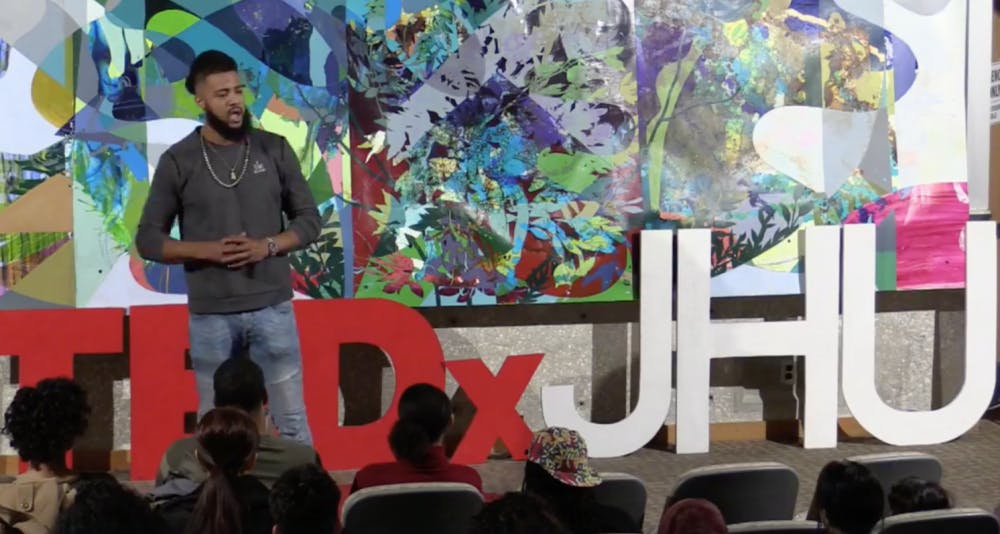Student run organization TEDxJHU hosted nine speakers at its annual spring conference on Saturday, March 10. The speakers included activists, artists and a Hopkins professor.
This year, the conference theme was “Forging the Future.” Junior Ansh Bhammar, one of the curators of the event, described the theme as a reaction to the current political climate.
“Right now we’re in a time of uncertainty in a lot of realms — political, social, academic and professional,” Bhammar said. “We really wanted to use this year’s main event to highlight how we can progress and move forward to solve those issues.”
Speakers drew from personal experiences in their speeches. For example, graduate student George Mwinnyaa spoke about how statistics in public health services can often be misleading.
“After my experience in the national immunization program [in Ghana], I got to learn that public health isn’t always about services. It’s about numbers,” he said.
He noted how despite the increased use of mosquito netting in Africa, the overall number of malaria cases has increased in recent years. He believes that properly fighting malaria requires observing how Africans were using the nets rather than just statistics about how many nets were distributed.
The event also hosted Katerina Jeng and Krystie Mak, co-founders of Slant’d, a publication which seeks to address Asian-American stereotypes. Jeng and Mak discussed how their childhood experiences with discrimination impacted their lives.
“For many Asian Americans, our story was written for us, not by us,” Jeng said.
Jordan Green, an associate professor of Biomedical Engineering (BME) at Hopkins, described how his initial experiences talking to engineers encouraged him to focus on projects that improved people’s lives, rather than profit margins.
As a student, Green talked to an engineer who talked about his work designing toothpaste. The toothpaste was designed to trick users into thinking that their teeth were cleaner than when they used other toothpaste brands.
Green decided he wanted to use engineering to do more honest work.
“Right then and there, I decided that this is not what I wanted to do with my life,” Green said.
Green’s lab focuses on creating synthetic viruses that can reprogram cells to treat illnesses.
René Vidal, a BME professor at Hopkins, discussed the advances in computer imaging that are currently revolutionizing medicine.
Tori Rose, a freshman BME major, appreciated listening to personal stories from people in her department.
“It’s nice to hear what motivates them to do these amazing things from them,” Rose said.
Other Hopkins affiliates who spoke at the event focused on medicine as well. Dr. Sapna Kudchadkar, a pediatric intensivist and anesthesiologist, spoke about the changes in pediatric intensive care units (ICU’s) that she has worked to introduce to Hopkins Hospital.
Her research suggests that activity and deep sleep aid children in their recovery after a hospital stay.
“Clearly the expectation of recovery was different than the reality,” Kudchadkar said. “For decades, we have had recovery systems that prioritize staff convenience in lieu of patient sleep.”
Another speaker, Aaron Maybin, agreed that art could be a powerful tool for societal change.
Maybin is a former NFL athlete turned community organizer and art teacher. He hopes to provide his elementary school students with proper heating, as well as other necessities.
“Change has never been the direct result of any march, it has never been the result of any retweet and it has never been the direct result of anybody sharing anything. But it has come from organizing,” he said.
When the Baltimore heating crisis hit in January, Maybin tweeted a 45-second video in which he talks to elementary school students and asks them about their day. In response, the kids say “cold.” The video went viral.
For Rose, hearing from Maybin in person brought the Baltimore space heater problem closer to home.
“I’d heard about the space heater issue, but I never knew what his work did in the viral video he made,” she said.
The final speaker, Schuyler Bailar, spoke about his life as an openly transgender division 1 athlete. He highlighted the supportive responses from his parents and grandparents — particularly his grandmother’s — to coming out.
“I’m here because of every single person who chose to share their common humanity with me and give me strength. I am here because of every single person who has told me that they love me,” Bailar said.
He told the audience what he told his grandmother when he came out.
“I’m just me, just trying to be happy, and I want you to understand and I love you dearly,” he said.
In an email to The News-Letter, TEDxJHU Communications Director Ruchit Patel, explained that TEDxJHU tries to select speakers from Hopkins, the Baltimore community, the U.S. and abroad.
“Our team works to have discussions on who to send invitations to, and we work to build a lineup with topics that can spark ideas and conversations,” Patel wrote.





